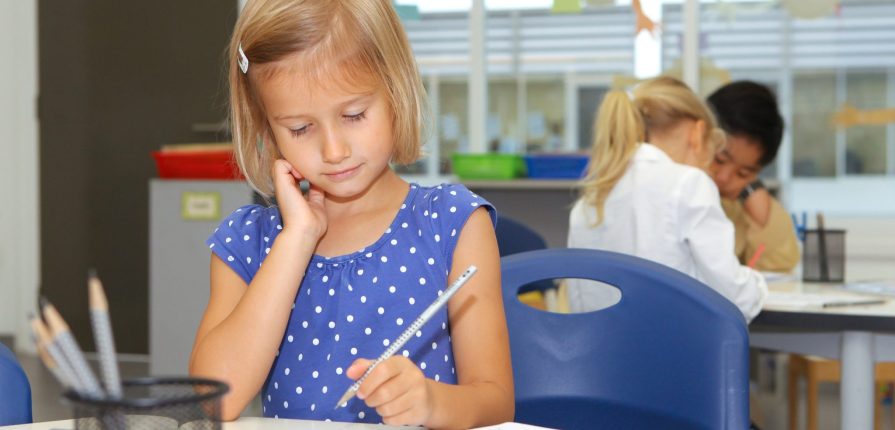Supporting Each Learner as a Writer in Elementary
by Anita McCallum (Elementary Principal)
“I like writing. I can make up a whole story and other people get to hear it.” – Kinder student
At Raffles American School, we are committed to ensuring that each student thrives as a learner. It is part of our Mission statement; it is part of all our professional learning conversations; it is part of every interaction and learning experience each day.
Throughout this year, teachers have focused on Writing as one of our Professional Learning Communities when we meet together on Friday afternoon. In Elementary, this has seen us develop ‘menus’ of writing skills that we use with children to ‘level up’ their writing. We have collaborated together to moderate writing tasks, share best practices and talk about the different strategies we can use to support individual learners. Starting with our smallest learners who are beginning to understand that marks have a meaning to our older learners who are learning to write polished pieces for different purposes and make sure their writing has pizzaz!
“…every child deserves to start where he or she is as a writer and to be challenged to go farther.” –Lucy Calkins
We recognize that all children as writers are unique and have different needs, and consequently, they need their learning experiences to be personalized. Each child has an area of writing they do well at and an area they need to work on to become a better writer. Our job is to meet them where they are currently and build upon their skills and confidence.
All children are supported by their teachers, who know what they can do and what goals they need to work on next. Conferencing with each child is an essential part of the writing process, giving them direct, personalized feedback. “Wow, I can see you have tried to use ambitious vocabulary here. Next time, we need to work on using a range of sentence openers to grab the attention of the reader.” Teachers work together to plan a myriad of learning experiences in all areas of writing, from spelling and word work to summative research projects, to ensure children are excited about learning and can access, engage, and express their understanding. We use the data from writing assessment tasks and observations from students writing each day to tailor differentiated learning experiences, so children are challenged to keep learning and growing in their abilities and confidence.
‘Every student can learn, just not on the same day, or the same way.’ –George Evans
Small group work is utilized to scaffold learning to ensure each child gets personalized attention and feedback as they write. Students are challenged with questions and tasks which are engaging using a range of resources from around the world. Specialist teachers and teaching assistants work with homeroom teachers in making sure that each child is focused on and challenged to continually develop their writing skills. Goal setting promotes independence, empowering them to be responsible and confident in their abilities. Not all writing is a polished finished piece. Sometimes we are working at the word level, focusing on phonics, spelling, and our understanding of how words are structured. Sometimes we work through the writing process, plan and draft our ideas, and then edit our work to improve it. Sometimes we are following a specific text type, and sometimes we are writing for the sheer enjoyment of being creative and sharing stories from our imagination.
How do you share with your children that you are a writer? Do they see you writing shopping lists and birthday cards? Do they see you writing in a journal each day? Do they see you writing work documents and editing and revising your writing? Working in partnership with parents is also a vital element of this process. Teachers share ‘curriculum flyers’ with parents throughout the term. The curriculum flyers provide parents with the text type (or genre) of writing that the children will be working on in their next unit so parents can ask questions and discuss with their children what interests them and what they are learning about at school. Key vocabulary and questions are included, so parents are able to discuss these important concepts with their children in their Mother Tongue.
Communication between parents and their child’s teacher is essential, and we believe that successful learning at Raffles American School is more than just repetitious memorization and report cards. It is a partnership between students, parents, and teachers that provides our students with the highest quality of learning to advance them into high school and beyond.
To learn more about Raffles American School, contact our admissions team at inquiry@raffles-american-school.edu.my


